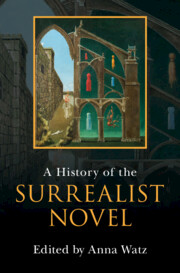Book contents
- A History of the Surrealist Novel
- A History of the Surrealist Novel
- Copyright page
- Dedication
- Contents
- Figures
- Contributors
- Acknowledgements
- Introduction
- I Marvellous Beginnings
- II Transgression and Excess
- Chapter 7 The Surrealist Novel and the Gothic
- Chapter 8 Surrealism’s Anti-Bildungsroman
- Chapter 9 The Mother Figure in the Surrealist Novel
- Chapter 10 British Surrealism at War
- Chapter 11 Surrealist Narratives of Trauma
- III Science, Alchemy, Nature
- IV Transnational Surrealism
- Index
Chapter 10 - British Surrealism at War
from II - Transgression and Excess
Published online by Cambridge University Press: 02 February 2023
- A History of the Surrealist Novel
- A History of the Surrealist Novel
- Copyright page
- Dedication
- Contents
- Figures
- Contributors
- Acknowledgements
- Introduction
- I Marvellous Beginnings
- II Transgression and Excess
- Chapter 7 The Surrealist Novel and the Gothic
- Chapter 8 Surrealism’s Anti-Bildungsroman
- Chapter 9 The Mother Figure in the Surrealist Novel
- Chapter 10 British Surrealism at War
- Chapter 11 Surrealist Narratives of Trauma
- III Science, Alchemy, Nature
- IV Transnational Surrealism
- Index
Summary
The surrealist imagination is an imagination at war. Born out of the horrors of the European trenches and catapulted into the nightmares of fascism, the Spanish Civil War, World War II, and the Holocaust, surrealism has always responded to the historical violence that has shaped and energized it. At the same time, however, surrealist responses to war are all too aware of their struggle to articulate their political nature. How can surrealism write war? What is the political import of surrealism’s indirect aesthetics? How might surrealist writing advance our understanding of the complexities of wartime subjectivity? This chapter explores these questions by turning its attention to two dark allegorical novels: Ruthven Todd’s Over the Mountain (1939) and Rex Warner’s The Aerodrome (1941). To date, discussions of British surrealist writing have confined themselves to the aesthetic and political contexts of interwar and wartime poetry. But there is a need to complicate this literary history if we are to better understand the diversity of British surrealist writing before, during, and after the Second World War. Whilst the novel was very much a marginal practice in 1930s and 1940s surrealist circles, it nevertheless emerged in the wartime period as a dark form of literary political enquiry; one that, coming through from the counter-Enlightenment impulses of the Gothic, poses disquieting questions about wartime human appetites for violence, corruption, and absolute power.
Keywords
- Type
- Chapter
- Information
- A History of the Surrealist Novel , pp. 168 - 183Publisher: Cambridge University PressPrint publication year: 2023



